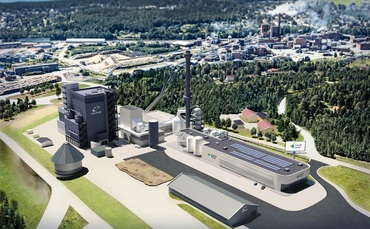Ørsted has abandoned plans for a large green fuel production plant in Sweden, citing slower-than-expected growth in the emerging market for low-carbon e-fuels in Europe.
Announcing its latest financial results yesterday, the company said it had accumulated impairment losses of 3.2 billion Danish kroner (£370 million) in the first half of this year, largely due to the decision to cancel its Flagship One e-methanol production project in Sweden, as well as ongoing delays to its Revolution Wind offshore wind farm project on the east coast of the US.
The decision comes just two years after the company announced a final investment decision for Flagship One. The project aims to use captured biogenic CO2 and renewable hydrogen to produce 55,000 tonnes of e-methanol for the shipping industry.
The British company Carbon Clean has been commissioned to provide carbon capture for the project planned in northern Sweden.
Offshore wind developers around the world have struggled with inflationary pressures over the past two years caused by supply chain disruptions and rising costs resulting from the energy crisis.
Ørsted, which canceled two high-profile wind power projects in the US last year, announced a strategic review of its business in February, reduced its investment and capacity targets and suspended its dividend payments.
Mads Nipper, CEO of Ørsted, said the company is now focused on “prioritizing growth options with the highest potential to create value.”
“The liquid e-fuels market in Europe is developing more slowly than expected and we have made the strategic decision to deprioritize our efforts in the market and stop the development of FlagshipONE,” he said. “We will continue to focus on renewable hydrogen and pursue our development efforts, which is critical for the decarbonization of key industries in Europe and closer to our core business.”
The decision came a few months after fossil fuel giant Shell suspended construction of a large biofuel plant in Rotterdam. The plant was supposed to produce so-called sustainable aviation fuel (SAF), which is intended to help decarbonise air travel.
Despite the cancellation of the e-fuels project, however, Nipper said he was overall “satisfied” with Ørsted’s half-year results, which showed the company’s operating profit rose to 14.1 billion krone (£1 billion) in the first half of this year, compared with 10.2 billion krone (£735 million) in the same period last year.
“Ørsted’s business is going well and in particular earnings from our offshore wind farms, our core business, have increased,” he said. “We are therefore maintaining our full-year EBITDA guidance and increasing our earnings expectations for our offshore wind business.”
However, he described the decision to postpone Revolution Wind’s commercial commissioning date from 2025 to 2026 following construction delays at an onshore substation as “disappointing”.
“In the first half of the year, we implemented the updated business plan we presented in February and we brought nearly 2 GW of renewable energy capacity into operation, supplying renewable energy to more than 1.5 million households on three continents,” said Nipper. “This is a significant contribution to Ørsted’s long-term renewable energy capacity goals.”
“Despite encouraging progress on our US offshore wind project Revolution Wind, construction of the onshore substation for the project has been delayed. This means we have pushed back the commercial commissioning date from 2025 to 2026, resulting in an impairment. This is of course unsatisfactory and we continue our committed efforts to de-risk our portfolio.”
Want to know what’s happening at the forefront of sustainability? Check out BusinessGreen Intelligence – the key information for professionals focused on the UK’s green economy.




